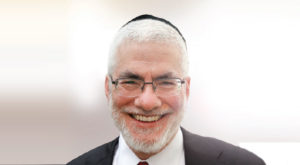Subjugate Your Will Before His

The retzon Hashem has decreed otherwise. It is time for some bittul

Rav Chaim Volozhiner, the famed talmid muvhak of the Vilna Gaon, had his eye on one of the stars of his yeshivah, Hillel Harodner, as a potential husband for his daughter, who was somewhat hearing impaired. As fate would have it, Hillel’s mother was coming to Volozhin to check on her son, and Rav Chaim decided it was an opportune time to suggest the shidduch.
To Rav Chaim’s great disappointment, Hillel’s mother was not interested, and she proceeded to head back home. Or so she intended. Her journey was halted when a wheel fell off her wagon, forcing the driver to stop and fix it. A short while later an axle broke, forcing another time-consuming repair. If these mishaps were not enough, one of the horses suddenly died, leaving the wagon stranded on the road. The woman made her way back to Volozhin, convinced the holy Rav Chaim had a hand in this.
She approached the great tzaddik and exclaimed, “Do you want to take him by force?”
Rav Chaim assured her he truly had nothing to do with her misfortune and encouraged her to return home, which she did.
Sometime later, Rav Chaim’s wife was planning a trip to the town where Hillel’s mother lived. Rav Chaim suggested that his rebbetzin approach the woman and redt the shidduch again, and empowered her to “close the deal” if the opportunity arose. The Rebbetzin asked Rav Chaim why he thought this time would be any different.
He responded: “Pirkei Avos teaches us [Chapter 2], ‘Batel retzoncha mipnei retzono, kedei sheyevatel ratzon acheirim mipnei retzonecha — Subordinate your will to His will, so that He will subordinate the will of others to yours.’ When the woman turned the shidduch down the first time, I felt it was not retzon Hashem to move forward, so I was mevatel my will to His. However, it is possible her refusal was born from her own will. If that was the case, now that I have submitted to the will of Hashem, He will subjugate her will to mine, as the Mishnah teaches.”
Sure enough, when the shidduch was suggested anew, Rav Hillel became Rav Chaim’s son-in-law.
Among the many challenges we have been subjected to over these last few months is bittul haratzon, total subjugation of our will to that of Hashem. It is especially trying when our religious fervor drives us to perform our daily duties as frum Jews. Not daven with a minyan? Impossible! Not holding a dignified levayah? No way! Being mevatel the learning of thousands of children? Unthinkable! But the retzon Hashem has decreed otherwise. It is time for some bittul — not just of the way we are accustomed to daven, learn Torah, and fulfill communal obligations, but complete bittul haratzon.
A number of years ago, a group of bochurim from the Philadelphia yeshivah were en route to the wedding of a close friend. Their presence was of great importance to the chosson, and they were given permission to attend, even at the expense of missing seder —not a given, as shemiras hasedorim was of the highest priority. They carefully timed their trip to arrive at the simchah in time to daven Minchah there.
As they approached New York, traffic slowed to the point that they had to make a decision. They could either continue straight to the wedding, and miss tefillah b’tzibbur; or they could stop off to find a shul, which meant they would likely miss the chuppah. One of the bochurim was particularly scrupulous about davening with a minyan, having never missed it since his bar mitzvah, and couldn’t bear the thought of davening b’yechidus. Somehow, the bochur was able to contact his rosh yeshivah, Rav Elya Svei ztz”l, and ask him what to do.
The answer was pure and simple: “Life is not about streaks, it’s about retzon Hashem.” The Rosh Yeshivah felt that the presence of the bochurim at the chuppah was critical and they could not gamble with being late. They would miss tefillah b’tzibbur, and yes, the streak would come to an end. It’s all about retzon Hashem and being mevatel my daas and my will to His.
Nowhere is this more manifest than in Megillas Rus, which we just read on Shavuos. Rus commits her entire life to Naomi and to serving Hashem, despite the expectation that she would never remarry, as the exception of Moavi v’lo Moavis was not yet accepted as normative halachah. Rav Dessler points out that when Rus tells Naomi, “Kol asher tomar eilai e’eseh — everything that you tell me, I will do,” the word eilai — to me — is not even written in the Megillah. It is only read (kri-kesiv). The message conveyed is that Rus was totally invisible and inconsequential in her own eyes. She had no personal ratzon at all when it came to following Naomi’s instructions.
This virtue of bittul haratzon extends to a length that many of us struggle to accept, yet is also mandated by the Torah. In parshas Shoftim, we learn, “Lo sasur min hadavar asher yagidu lecha yamin u’smol — You cannot veer from all that they instruct you, to the right or the left.”
The Sefer Hachinuch, after explaining the basic mitzvah — a prohibition against arguing with or distorting the words of those who teach us the tradition of Torah — gives a novel and fascinating insight. To paraphrase, it is a given that people have differences of opinion. Hashem knows that if everyone were given license to interpret the Torah as he saw fit, the resulting tremendous disagreement would make it appear as if there were multiple Toros, chalilah.
We are therefore mandated to fulfill the Torah in line with the accepted understanding of the chachamim passed down to us through the generations. Even if they are mistaken in a particular matter, it is not proper to take issue with them; rather we must do as they instruct. It is better to follow their opinion, mistake notwithstanding, than to have everyone doing their own thing, for that would lead to churban hadas — destruction of our religion. The Navi describes the generation during the time of the Judges as each man doing what he considered to be fit in his own eyes. That did not lead to good results.
This also underlies the principle of following the majority opinion, “acharei rabim l’hatos.” The Chinuch explains the narrative in the Gemara describing how the chachamim in the majority were left with no choice but to excommunicate Rabi Eliezer Hagadol for not giving in to their halachic decision, regardless of the open miracles Hashem performed to validate his opinion. “Lo baShamayim hi,” it is not left to the Heavens to decide halachah.
Nor was it in the purview of an individual, even one as great as Rabi Eliezer, to determine the halachah on his own, and even if he knew he was right and had miracles to back him up. To declare otherwise causes churban hadas. This is the retzon Hashem and our marching orders to preserve His Torah. My personal opinion, justified as it is, is batel in the face of an opposing majority, even if I am certain I am right. If someone with the stature of Rabi Eliezer did not have the authority to buck the trend, who are we to assert our opinion over that of the chachamim?
I once related this Sefer Hachinuch to a group that included a prominent askan who was the president of the board of a local institution. Apparently, he had a strong disagreement with the institution’s rabbinical board, which was led by a highly respected talmid chacham.
After I concluded my drashah, he made a beeline for me and declared, with an expression of validation on his face, “That’s exactly the problem with the vaad. I’m the president and they have to listen to me.”
If it weren’t true, it would be nothing short of Purim shpiel material. He was right. That was exactly the problem. He wasn’t listening to them.
Among the many challenges we have faced of late is maintaining our unwavering commitment to the talmidei chachamim, interpreters of the Torah, as they have had to implement extremely difficult decisions. Closing shuls, mikvaos, and schools are only three of the enormous responsibilities that our leaders and einei ha’eidah have had to grapple with. Most of us are not privy to the individual sh’eilos that required application of their keen chochmah and daas Torah, many of which we are hard-pressed to find precedent for. (Does an 85-year-old almanah really have to celebrate Pesach alone? Can she leave a radio on over Yom Tov to maintain her sanity? The list goes on.)
If, as we see, our resolve to fulfill Torah and mitzvos is being put to the test, then we must commit to kiyum hadas, not churban hadas. How the rabbanim deal with their own differences of opinion remains behind the closed doors of their hallowed meeting rooms or teleconferences. Their decisions are based on Torah values and their mesoros (and yes, there are more than one) in how to approach these issues within their kehillos. What is in our hands is how we react to their directives and refrain from undermining their leadership.
Not that I am worthy of revelations min haShamayim, but the following experience gave me great chizuk, and could be a source of chizuk to others with respect to the concepts discussed above. The closing of shuls and minyanim was particularly painful for me and my family, as we were still within the year of aveilus for our mother a”h, but left unable to say Kaddish or lead the davening. We did what we could, learning Mishnayos and making siyumim, and delegated the Kaddish to others when possible. I held out hope that at least by her yahrtzeit, on the 26th of Iyar, I would have one last shot. The government had begun to slowly ease restrictions, and backyard minyanim were sprouting in neighborhoods where the rabbanim followed suit.
Alas, in my neck of the woods, the mandate from the rabbinic leadership was clear: It was not yet time to allow minyanim, and I resolved not to ignore them, just as my mother a”h would have wanted. “Mir darf zei fulgin — we have to listen to them,” was a common refrain of hers.
By that fateful Wednesday afternoon, I had already davened Maariv, Shacharis, and Minchah when the rabbinical group with which I am aligned decided to lift the ban, only a few hours before sunset. There was one Kaddish left to salvage, and I would have the chance to say it. Some have suggested this was a parting gift from the nifteres, before the neshamah took its higher place in ginzei meromim.
It could simply have been the principle of subjugation of personal ratzon at work. We leave the rest to retzon Hashem.
(Originally featured in Mishpacha, Issue 816)
Oops! We could not locate your form.













